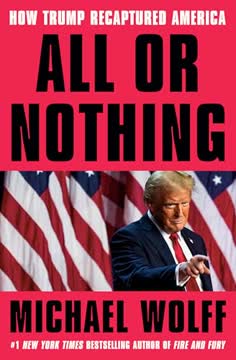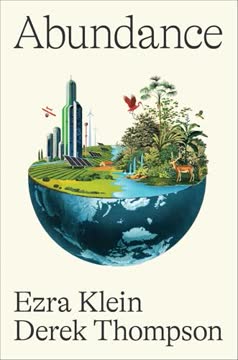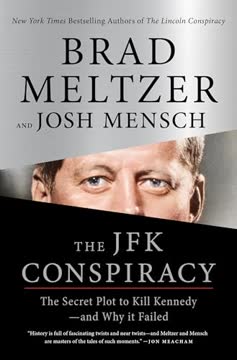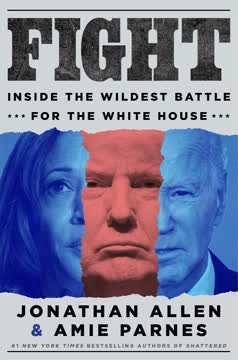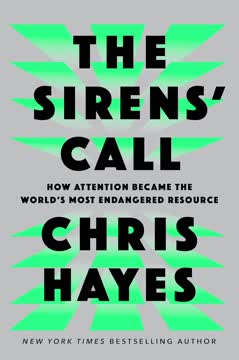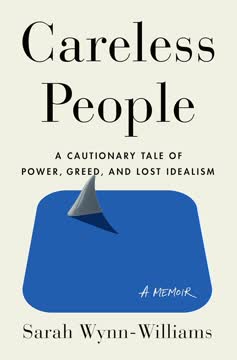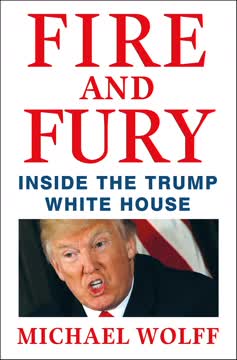Key Takeaways
1. Trump's Unwavering Self-Belief Fuels Political Survival
Perhaps disgrace, too, has special power—if you refuse to accept your disgrace, it becomes righteousness.
Defiance as a strategy. Donald Trump's most remarkable trait is his unwavering belief in his own righteousness, even in the face of overwhelming evidence to the contrary. This defiance, bordering on delusion, transforms disgrace into a form of political power, resonating with his base and confounding his opponents.
Examples of Trump's defiance:
- His insistence that the 2020 election was stolen, despite numerous recounts and court rulings
- His ability to shrug off scandals that would sink other politicians, such as the Access Hollywood tape
- His continued pursuit of the presidency despite facing multiple indictments
The power of certainty. Trump's unwavering certainty, even when divorced from reality, has a magnetic effect on his supporters. This certainty provides a sense of stability and conviction in a chaotic world, making him a compelling figure for those seeking strong leadership.
2. The "Split Screen" Reality: Legal Peril vs. Political Opportunity
Our legal strategy is our media strategy; our media strategy is our legal strategy.
Parallel realities. Trump operates in a "split screen" reality, where his legal troubles exist alongside his political opportunities. What would typically disqualify a candidate—criminal indictments, civil judgments—instead fuels his base, earns him media attention, and drives fundraising.
Examples of the split screen:
- The announcement of his indictment in New York led to a surge in campaign donations.
- His arraignment in Miami became a rally, with supporters chanting his name.
- His mugshot became a fundraising tool, emblazoned on merchandise.
Blurring the lines. Trump intentionally blurs the lines between his legal and media strategies, using each to amplify the other. He understands that in the modern media landscape, all attention is valuable, regardless of its source.
3. Trump's Lawyer Relationships: A Revolving Door of Loyalty and Grift
Why do I have such shitty lawyers? How is this happening? How did the lawyers get this so wrong?
The Roy Cohn myth. Trump seeks a lawyer who can act as a fixer, a diabolical magician who can get him out of any jam. This ideal, based on his former lawyer Roy Cohn, is impossible to meet, leading to a constant turnover of legal representation.
Qualities Trump seeks in a lawyer:
- Unwavering loyalty and abject flattery
- Aggressiveness and a willingness to fight dirty
- A telegenic presence and ability to dominate the media
The role of Boris Epshteyn. Boris, despite his questionable legal credentials and social impairments, becomes a key figure in Trump's legal defense due to his unwavering loyalty and willingness to tell Trump what he wants to hear.
4. Media Manipulation as a Core Campaign Strategy
Legal and media are the same thing, the exact same thing to me.
Controlling the narrative. Trump understands the power of media manipulation and uses it to his advantage. He dictates the terms of his coverage, often by creating chaos and controversy, and uses his platform to bypass traditional media outlets.
Examples of media manipulation:
- Announcing his own indictment on Truth Social to control the narrative
- Using rallies and press conferences to dominate the news cycle
- Leveraging social media to bypass traditional media gatekeepers
The white Bronco effect. Trump seeks to create "white Bronco" moments, where the world's cameras are focused on him, regardless of the reason. This strategy ensures that he remains at the center of attention, even during times of crisis.
5. The Power of "Weird": How Unlikely Figures Gain Influence in Trumpworld
She just loves her president.
Sycophancy as a currency. In Trumpworld, loyalty and adulation are highly valued commodities. Those who demonstrate unwavering devotion, even to the point of absurdity, often gain access and influence.
The case of Natalie Harp. Natalie, a former OAN host, rises to prominence in Trump's inner circle due to her unwavering support and willingness to cater to his every whim. She becomes a gatekeeper, controlling access to Trump and shaping his perception of events.
Undermining expertise. Trump often elevates individuals who lack traditional qualifications or experience, using their presence to undermine the authority of experts and reinforce his own sense of control.
6. The January 6 Indictment: A Defining Moment, Reimagined
They’re trying to put me away forever. Throw away the key.
From disgrace to righteousness. The January 6 indictment, which many saw as a defining moment of Trump's presidency, becomes a rallying cry for his supporters. Trump reframes the attack on the Capitol as a defense of democracy, casting himself as a martyr persecuted by the establishment.
The Nazi comparison. Trump's use of Nazi imagery and rhetoric, while shocking to many, resonates with a segment of his base who see themselves as victims of a similar kind of persecution.
The co-conspirators. The indictment names six unnamed co-conspirators, creating a climate of suspicion and paranoia within Trumpworld as individuals try to determine who might be cooperating with the authorities.
7. The Evolving Role of Family: From Dynasty to Distraction
I think part of the beauty is that mystery.
Melania's absence. Melania's increasing absence from the campaign trail becomes a source of speculation and concern. Her disinterest in politics and apparent estrangement from her husband raise questions about the state of their marriage and the future of the Trump dynasty.
Ivanka and Jared's distance. Ivanka and Jared, once key figures in Trump's inner circle, maintain a carefully curated distance from his political activities, focusing on their own business ventures and social lives.
Lara Trump's rise. Lara Trump, Eric's wife, steps into the void, becoming a more visible presence in the campaign and assuming a leadership role within the RNC.
8. The 2024 Campaign: Inevitability vs. Incompetence
Our legal strategy is our media strategy; our media strategy is our legal strategy.
A campaign of inevitability. Despite facing numerous legal challenges and controversies, Trump maintains a commanding lead in the Republican primary, creating a sense of inevitability around his nomination.
The Wiles-LaCivita team. The professional leadership of Susie Wiles and Chris LaCivita brings a new level of competence and discipline to the Trump campaign, contrasting with the chaos and infighting of previous campaigns.
The Trump variable. Despite the efforts of his team, Trump remains the greatest variable in the campaign, prone to impulsive decisions and unpredictable behavior that can undermine even the best-laid plans.
9. The Debate Dodge: Trump's Calculated Absence
Do you think indictment is bigger than impeachment?
The art of counter-programming. Trump's decision to skip the Republican primary debates, while risky, allows him to control the narrative and deny his opponents valuable airtime. He understands that his presence is the main draw, and he can generate more attention by counter-programming than by participating.
The Tucker Carlson interview. Trump's decision to grant an exclusive interview to Tucker Carlson, rather than participate in the Fox News debate, demonstrates his willingness to bypass traditional media outlets and connect directly with his base.
The power of attention. Trump understands that in the modern media landscape, attention is the ultimate currency. He is willing to sacrifice traditional political strategies in order to maximize his share of the spotlight.
10. The "Fifth" Indictment and the New Legal Landscape
They’re only doing this because they’re afraid of us. This puts us in front of every camera in the world.
Technicalities vs. existential threats. Trump's legal team characterizes the various indictments as technicalities, downplaying their significance and arguing that they are politically motivated.
The "split screen" revisited. The campaign continues to operate on a "split screen," acknowledging the legal challenges while simultaneously emphasizing the political opportunities they create.
The invulnerability thesis. Trump and his inner circle cling to the belief that he is invulnerable, that his supporters will not be swayed by legal troubles, and that any attempt to bring him down will only strengthen his resolve.
11. The Power of Delusion: How Certainty Shapes Reality
I think they’re delaying this a month so that they can drop it. Mr. President, I promise you this whole thing just goes away.
Boris Epshteyn's role. Boris, as Trump's legal advisor, consistently feeds his delusion, assuring him that his legal troubles will disappear and that he is invulnerable. This constant reassurance, while divorced from reality, reinforces Trump's sense of certainty and fuels his political ambitions.
The Mar-a-Lago bubble. Mar-a-Lago becomes a haven for sycophants and opportunists who reinforce Trump's delusions and shield him from dissenting voices. This creates a distorted reality where Trump's views are constantly validated, regardless of the facts.
The art of the possible. Trump's ability to defy logic and practicality, to see himself as the rightful and deserving president even after defeat, becomes a source of power. His unwavering certainty, even when psychotic, convinces many that he knows something the rest of us don't.
12. The Unpredictable Nature of Trumpworld: Chaos and Opportunity
Our legal strategy is our media strategy; our media strategy is our legal strategy.
The constant state of flux. Trumpworld is characterized by constant change, shifting alliances, and unexpected events. What seems stable one day can be upended the next, creating a sense of perpetual uncertainty.
The role of chaos. Trump thrives on chaos, using it to disrupt the status quo, control the narrative, and keep his opponents off balance. He is a master of creating and exploiting disorder, turning it into a source of political advantage.
The ultimate gamble. Trump's third presidential campaign becomes a high-stakes gamble, where the stakes are not just political power but his own personal freedom. His proposition to voters is simple: Elect me or destroy me.
Last updated:
FAQ
What’s All or Nothing: How Trump Recaptured America by Michael Wolff about?
- Comprehensive campaign chronicle: The book provides an insider’s account of Donald Trump’s 2024 presidential campaign, focusing on his legal battles, campaign strategies, and the personal and political dynamics surrounding him.
- Legal and political drama: It details Trump’s criminal trial in New York, the interplay between his legal troubles and campaign messaging, and the unprecedented fusion of courtroom drama with political theater.
- Key figures and events: Wolff explores the roles of campaign managers, legal advisers, family members, and loyal aides, while covering pivotal events like debates, conventions, and assassination attempts.
- Intimate portrait of Trump: The narrative offers a close-up look at Trump’s character, moods, and leadership style, revealing both his resilience and the chaos within his inner circle.
Why should I read All or Nothing: How Trump Recaptured America by Michael Wolff?
- Unprecedented insider access: Wolff’s reporting provides rare, behind-the-scenes details about Trump’s campaign, legal team, and personal relationships, offering a nuanced understanding of contemporary American politics.
- Balanced and multifaceted portrayal: The book neither glorifies nor vilifies Trump, instead presenting a complex portrait that helps readers grasp the forces shaping his political resurgence.
- Context for 2024 election: By chronicling the campaign, legal battles, and major events, the book situates the 2024 election within the broader landscape of American political polarization and media spectacle.
- Essential for political observers: Anyone interested in the intersection of law, media, and politics will find the book’s analysis of Trump’s strategies and the campaign’s internal dynamics invaluable.
What are the key takeaways from All or Nothing: How Trump Recaptured America by Michael Wolff?
- Legal and political battles intertwined: Trump’s criminal trial and campaign are deeply connected, with legal setbacks influencing campaign dynamics and vice versa, shaping public perception and strategy.
- Campaign chaos and resilience: The campaign is marked by internal conflict, power struggles, and a mix of professional operatives and chaotic personalities, reflecting Trump’s own unpredictability.
- Media and legal strategy fusion: Trump’s mantra that “our legal strategy is our media strategy” blurs the lines between courtroom defense and public relations, turning legal challenges into political opportunities.
- Personal relationships impact politics: The book highlights the complex roles of family members, loyal aides, and confidants, showing how personal dynamics affect campaign cohesion and decision-making.
Who are the key figures in Donald Trump’s campaign and legal team in All or Nothing: How Trump Recaptured America by Michael Wolff?
- Susie Wiles and Chris LaCivita: These campaign managers provide organization and discipline, acting as stabilizing forces amid internal chaos and power struggles.
- Boris Epshteyn: A controversial legal adviser and Trump loyalist, often seen as the “new Roy Cohn,” who manages much of Trump’s legal messaging and wields significant influence.
- Alina Habba and Todd Blanche: Lawyers involved in Trump’s legal defense, with Habba’s loyalty valued over experience and Blanche leading the Stormy Daniels trial defense.
- Natalie Harp: A devoted aide who controls Trump’s information flow and social media, becoming a key gatekeeper and influencer within the campaign.
- Corey Lewandowski and other rivals: Figures like Lewandowski and outside influencers such as Ike Perlmutter and Elon Musk add to the campaign’s internal complexity and factional battles.
How does Michael Wolff describe Donald Trump’s legal strategy and its connection to media in All or Nothing: How Trump Recaptured America?
- Legal strategy as media spectacle: Trump’s approach fuses legal defense with media dominance, using court appearances and indictments to energize his base and control news cycles.
- Blurring traditional boundaries: The mantra “our legal strategy is our media strategy” dissolves the separation between courtroom tactics and public relations, making every legal event a campaign opportunity.
- Aggressive public messaging: Trump and his team use social media, public statements, and courtroom drama to shape narratives, often complicating traditional legal strategies.
- Impact on legal proceedings: This approach leads to unconventional tactics, frequent outbursts, and a focus on spectacle over legal decorum, sometimes to the frustration of his legal team.
What major legal cases and indictments are covered in All or Nothing: How Trump Recaptured America by Michael Wolff?
- New York criminal indictment: The first-ever criminal indictment of a U.S. president, related to hush money payments to Stormy Daniels and falsified business records.
- E. Jean Carroll civil trial: A defamation and sexual abuse case resulting in significant financial judgments against Trump.
- Georgia RICO indictment: State-level charges involving election interference under the Racketeer Influenced and Corrupt Organizations Act.
- Federal January 6 indictment: Charges related to the Capitol attack and efforts to overturn the 2020 election, considered Trump’s most serious legal threat.
- Boxes indictment and civil fraud: Federal charges for mishandling classified documents and a New York civil fraud trial over inflated real estate valuations.
How does All or Nothing: How Trump Recaptured America by Michael Wolff portray the internal dynamics and power struggles within Trump’s campaign?
- Tension between professionalism and chaos: The campaign is a battleground between experienced operatives and erratic loyalists, creating a volatile environment.
- Factional battles and leaks: Rivalries, especially between Wiles/LaCivita and Lewandowski/Habba, lead to leaks, attempted takeovers, and ongoing instability.
- Influence of outside figures: Billionaires, media moguls, and tech leaders like Elon Musk play behind-the-scenes roles, affecting decisions and internal dynamics.
- Impact on effectiveness: Despite the chaos, Wiles and LaCivita maintain relative stability, but the power struggles often undermine messaging and organization.
How does Michael Wolff depict Donald Trump’s personality and leadership style in All or Nothing: How Trump Recaptured America?
- Unyielding self-image: Trump sees himself as uniquely destined and above ordinary rules, refusing to acknowledge defeat or legal jeopardy.
- Mercurial moods: His temperament swings rapidly from fury to charm to self-pity, making him unpredictable and difficult to manage.
- Obsessive and performative: He fixates on themes like the stolen election and legal persecution, using media and public appearances as stages for personal drama.
- Reliance on loyalty: Trump surrounds himself with sycophants, values loyalty above competence, and is deeply suspicious of dissent within his circle.
What role do family members and close aides play in Donald Trump’s campaign, according to All or Nothing: How Trump Recaptured America by Michael Wolff?
- Melania Trump’s absence: Melania is largely absent from the campaign and court appearances, fueling speculation about marital strain and signaling personal discord.
- Children’s involvement: Don Jr., Eric, and Tiffany are active in the campaign, while Ivanka and Barron are notably distant; Lara Trump plays a public role with her own ambitions.
- Loyal aides as gatekeepers: Figures like Natalie Harp and Boris Epshteyn filter information and provide unwavering support, creating a bubble around Trump.
- Family as employees: Many family members act more as staff than relatives, reflecting fractured personal relationships that impact campaign cohesion.
How does All or Nothing: How Trump Recaptured America by Michael Wolff portray the 2024 presidential debates and conventions?
- Debates as pivotal moments: The book covers Trump’s preparation and performance, including a chaotic debate with Kamala Harris and a vice-presidential debate featuring JD Vance.
- Conventions as theater: The Republican convention is depicted as a celebration of Trump’s resilience, especially after the assassination attempt, while the Democratic convention highlights Harris’s rise.
- Media and public reactions: Both events generate intense coverage, shaping public perceptions and influencing campaign momentum.
- Contrast in styles: Trump’s appearances are theatrical and controversial, while Harris’s are calculated and controlled, reflecting broader campaign strategies.
What impact did assassination attempts have on Donald Trump’s campaign, according to All or Nothing: How Trump Recaptured America by Michael Wolff?
- Butler, Pennsylvania shooting: The first attempt, where Trump was grazed by a bullet, is portrayed as a miraculous survival that boosts his image and energizes supporters.
- Second attempt and security: A subsequent plot in Florida leads to heightened security and reinforces Trump’s narrative of being targeted by deep conspiracies.
- Political and psychological effects: The attempts deepen Trump’s sense of persecution, fuel his combative rhetoric, and contribute to his fatigue and paranoia.
- Campaign leverage: These events are used for fundraising and media attention, shaping the campaign’s tone and Trump’s personal state.
What are the most important concepts and strategies in All or Nothing: How Trump Recaptured America by Michael Wolff?
- Legal strategy as media strategy: Trump’s fusion of legal defense and media spectacle is central, turning legal challenges into political opportunities.
- Campaign chaos vs. discipline: The tension between professional management and chaotic loyalists defines the campaign’s internal dynamics.
- Victimhood and resilience narrative: Trump’s portrayal of himself as a persecuted outsider fuels his base and shapes public perception.
- Personal relationships as power structures: The roles of family, loyal aides, and outside influencers are crucial in understanding the campaign’s decision-making and effectiveness.
Review Summary
Readers found All or Nothing to be a gossipy, insider look at Trump's 2024 campaign and presidency. Many praised Wolff's writing style and insights into Trump's inner circle, though some questioned the sourcing and bias. The book was seen as entertaining but potentially lacking in new information for those following politics closely. Criticisms included disjointed writing and a focus on sensationalism. Overall, reviewers found it a compelling if sometimes frustrating read that captured the chaos of Trump's world.
Similar Books
Download PDF
Download EPUB
.epub digital book format is ideal for reading ebooks on phones, tablets, and e-readers.
